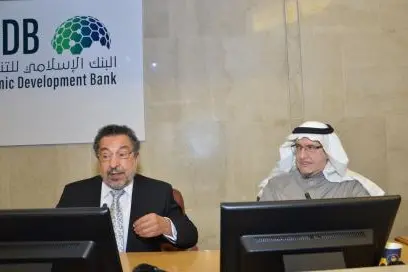PHOTO
Jeddah: Winner of the 2019 Islamic Development Bank (IsDB) Prize in Islamic Economics, Banking and Finance, Dr. Mabid Al-Jarhi, has delivered a lecture on the gains of switching from conventional to Islamic Finance.
The lecture was organized by the Islamic Research and Training Institute (IRTI), as part of an annual series in which IsDB Prize Laureates deliver lectures on major contemporary issues in Islamic Economics and Finance.
Dr. Al-Jarhi presented the lecture, titled ‘Search Models, Samuelson-Friedman’s & Hosios’ Inefficiencies and Islamic Finance’, on 12 December 2019 at the IsDB Headquarters in Jeddah, Saudi Arabia. Full text of the lecture is available for download here.
He argues that mainstream economics (known as neoclassical economics) has many limitations, and therefore economists need to be able to identify the weaknesses and propose alternative frameworks. The principles of Islamic Economics, he argues, provide such a framework.
Positive interest rate on lending money, Dr. Al Jarhi argues further, causes inefficiency as it leads to the substitution of money for real resources, which leads to inefficient allocation of resources. However, prohibiting interest on money is not sufficient from an Islamic Finance point of view. Financing through trade (like deferred sale) contributes to addressing another kind of inefficiency arising from search for trade partners. Together, prohibition of interest and financing through trade, would improve allocation of resources in the economy.
In addressing questions from the audience, Dr. Al-Jarhi warns that there is a lot to be done to have a proper Islamic financial system in place. Proper regulations and governance are neccessary to address other kinds of inefficiencies arising from partnership of equity financing.
Dr. Al-Jarhi, a monetary and financial economist, is a Professor of Economics and Finance at Ankara Social Sciences University in Turkey. He was awarded the 2019 IsDB Prize in Islamic Economics, Banking and Finance in recognition of his immense contributions to Islamic Economics in a career spanning over four decades.
About IRTI:
The Islamic Research and Training Institute (IRTI) is a Member of the Islamic Development Bank (IsDB) Group responsible for knowledge creation and dissemination in Islamic Economics and Finance, and fostering the use of Islamic Finance to contribute to the sustainable development of IsDB member countries. More information about IRTI is available on www.irti.org . For enquiries about IRTI, please contact Habeeb Idris Pindiga ( hpindiga@isdb.org ).
© Press Release 2019Disclaimer: The contents of this press release was provided from an external third party provider. This website is not responsible for, and does not control, such external content. This content is provided on an “as is” and “as available” basis and has not been edited in any way. Neither this website nor our affiliates guarantee the accuracy of or endorse the views or opinions expressed in this press release.
The press release is provided for informational purposes only. The content does not provide tax, legal or investment advice or opinion regarding the suitability, value or profitability of any particular security, portfolio or investment strategy. Neither this website nor our affiliates shall be liable for any errors or inaccuracies in the content, or for any actions taken by you in reliance thereon. You expressly agree that your use of the information within this article is at your sole risk.
To the fullest extent permitted by applicable law, this website, its parent company, its subsidiaries, its affiliates and the respective shareholders, directors, officers, employees, agents, advertisers, content providers and licensors will not be liable (jointly or severally) to you for any direct, indirect, consequential, special, incidental, punitive or exemplary damages, including without limitation, lost profits, lost savings and lost revenues, whether in negligence, tort, contract or any other theory of liability, even if the parties have been advised of the possibility or could have foreseen any such damages.




















